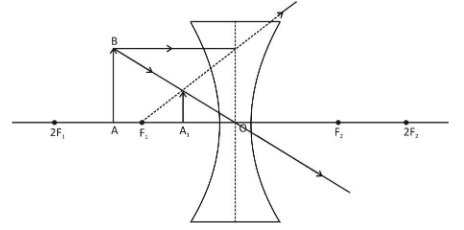Question
Question: Lens formula is given by _ _ _ _ _ _ _ _...
Lens formula is given by _ _ _ _ _ _ _ _
Solution
In this question, we need to establish the Lens formula. For this we will use the relation between image distance, object distance, and focal length in case of either convex or concave lens.
Complete step by step answer:
Let AB represent an object placed at right angles to the principal axis at a distance greater than the focal length (f) of the convex lens. The image A1B1 is formed between O and F1 on the same side as the object is kept, and the image is erect and virtual.

By sign conventions, all distances are given by
OF1=focal length=f
OA=object distance=u
OA1=v
Now, ΔOABandΔOAB,are similar [because ∠BAO=∠BAO=90∘,vertex O is common for both the triangles so ∠AOB=∠ABO So, ∠ABO=∠ABO are similar]
From similarity criteria, we have
⇒ABA1=OAOA1......(i)
Similarly, ΔOCFandΔFABare also similar
So,OCA1B1=OF1A1F1.....(ii)
But from the ray diagram, we see
So, equation (ii) becomes
⇒ABA1B1=OF1A1F1=OF1OF1−OA1 ⇒ABA1B1=OF1OF1−OA1.....(iii)
From equation (i) and equation (iii), we get
⇒OAOA1=OF1OF1−OA1
By sign conventions,
⇒OA1=−v ⇒OA=−u ⇒OF1=−f
So, we have
Dividing both sides by uvf
⇒uvf−vf=uvf−uf+uvfuv ⇒u−1=v−1+f1 ⇒f1=v1=u1
Hence, the required formula for the lens is given as f1=v1=u1.
Note: Before finding the lens formula, we must remember the sign convention for the lens, which is
(i) All distances are to be measured from the optical center of the lens.
(ii) Distances measured in the direction of incident ray (which is from left to right) are taken as positive.
(iii) Distances measured in the direction opposite to incident ray are taken as negative.
(vi) Height measured upward; the principal axis is taken as positive.
(v) Height measured downward; the principal axis is taken as negative.
